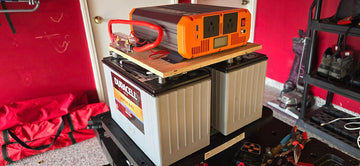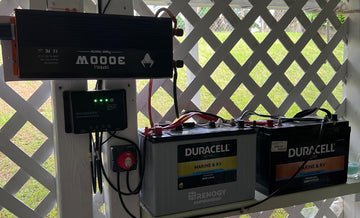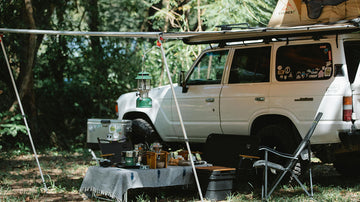Inside this Article:
What is a solar panel kit
A solar panel kit is a complete solar power system that includes key components such as solar panels, inverters, racking, cables and more. These components work together to convert solar energy into electricity for use in homes, industry, agriculture and more. The use of solar kits not only helps reduce dependence on traditional energy sources and lower energy costs, but also contributes to environmental protection.
The use of complete kits helps to reduce the amount of personal research you have to do on individual components, making them ideal for solar novices. If you are unfamiliar with the technical aspects of solar energy, it can be challenging to get components that work together properly. Solar panel kits handle this integration for you.
Components of a solar panel kit
- Solar Panel: The solar panel is the core part of the solar kit and is responsible for converting solar energy into electricity. It consists of multiple solar cell units, each of which converts light energy into direct current.
- Inverter: The inverter is another important component of the solar kit that converts the DC power generated by the solar panels into AC power for use in homes, industries, etc.
- Solar Controller: The charge controller is an important part of the solar kit. Your solar panel or solar array sends direct current (DC) electricity through the charge controller so you can store it in the battery bank.
- Racking: Racking is used to support the solar panels to ensure that they receive sunlight at the optimum angle. The material and design of the bracket should be able to withstand natural conditions such as wind, rain and snow.
- Cables and connectors: Cables and connectors are used to connect solar panels, inverters and other components to form a complete circuit.
- Battery storage system (optional): In some occasions where electricity needs to be stored, the solar kit can also be equipped with a battery storage system. In this way, the power supply can be guaranteed even at night or in rainy weather.
How the solar kit system works
The core component of a solar power panel kit is the solar panel, also known as the solar cell module. When sunlight hits the solar panel, photons from the sunlight interact with the semiconductor material in the solar panel to produce electrons and holes (i.e. positively charged particles). Under the action of the electric field inside the solar panel, the electrons and holes move in opposite directions, forming an electric current. This is the basic principle by which solar panels convert solar energy into electricity.
However, the current generated by solar panels is direct current (DC), while the current we use in our daily lives is alternating current (AC). Therefore, solar power panel kits also contain the key component of an inverter. The role of the inverter is to convert the DC current generated by the solar panel into AC current for our daily use.
What are the advantages of solar panel kits
- Environmental protection and energy saving: solar energy is a clean, renewable energy source, the use of solar kits can reduce dependence on fossil fuels, reduce greenhouse gas emissions, and contribute to environmental protection.
- Reduce energy costs: using solar kits can reduce energy costs in homes, industries and other areas. Especially in sunny areas, solar kits can achieve almost zero-cost power supply.
- Independent power supply: Solar kits can operate independently of the power grid, providing a stable power supply to remote areas or areas with unstable power grids.
- Low Maintenance Costs: Solar kits have relatively low maintenance costs. Solar panels have a long lifespan and do not require frequent replacement. In addition, key components such as inverters have high reliability.
Is it worth buying a solar complete kit?
Whether it is worthwhile to buy a solar complete kit depends on your specific needs and situation. If you live in a sunny area and have high requirements for environmental protection and energy saving, then buying a solar complete kit is a good choice. In addition, if you need to provide power supply to remote areas or areas with unstable power grids, then a solar kit is also an ideal solution.
Most people choose to install solar panel kits to lower their energy costs, reduce their impact on the environment, or both.
There are many different factors to consider when evaluating the long-term value of solar panels. The immediate cost may seem high, but this must be compared to the energy savings and potential tax benefits.
Electricity is one of the most expensive utility costs. Using solar energy can greatly reduce your electric bill; even if you don't generate all the energy you consume, you can still save money even if using some solar energy will reduce your utility bill.
Investing in a solar panel kit and installation requires an initial upfront cost. However, after the initial installation, you will save money on your energy bills every month. By installing solar with a kit, you can reduce some of the initial installation costs of your solar system.
Solar kits are easily upgraded in the future if you decide to add more panels and generating capacity. These kits are also much cheaper now than they were a decade ago due to advances in technology and increased adoption.
The efficiency of your solar panels will depend on the weather and amount of sunlight in your area, as well as the type of home or vehicle you need to power. However, many solar customers are quickly seeing positive returns, which is enough to justify the investment in a solar panel kit. You'll also ensure that ongoing utility costs are future-proofed and prevent unpredictable power cost increases.
Many states, governments, and utility organizations offer further financial incentives to encourage the continued expansion of solar energy use across the United States. Solar tax credits and other financial incentives can make solar energy more accessible to homeowners. Depending on your location, available solar incentives can reduce the net cost of your solar panel system by 26 to 50 percent.
Installing solar on your home can also increase its value. Many homebuyers see solar as a central selling point because of its potential to reduce electricity bills and minimize carbon footprints.
In addition to being cost-effective, solar energy is a renewable energy source that can have a positive impact on the environment. Solar systems do not produce air pollution or greenhouse gases. Solar energy also contributes to U.S. energy independence and provides more jobs than the U.S. coal or upstream oil and gas sectors.
Solar kits are definitely worth the initial investment, both in terms of saving money and reducing carbon emissions. With the increased availability of solar kits, switching to solar is not as scary, expensive or complicated as it once was.
How to Choose the Best Solar Panel Kit
When choosing a solar panel kit, you need to consider the following factors:
- Quality and Brand: Choosing a well-known brand and a solar kit supplier with a good reputation can ensure the quality of the product and after-sales service.
- Power & Efficiency: Choose the right solar panel kit with the right power and efficiency according to your electricity needs. Generally speaking, the higher the power and efficiency of the kit, the stronger its power generation capacity.
- Price & Cost Effectiveness: When purchasing a solar kit, you should not only consider the price factor, but also pay attention to the cost effectiveness of the product. Choosing a reasonably priced solar kit with superior performance will ensure your return on investment.
- Installation and Maintenance: Understanding the installation and maintenance requirements of the solar kit ensures that you can easily carry out the installation and maintenance work. In addition, choosing a supplier that provides perfect after-sales service can also save you more heartache during the process.
The right solar kit for you
Home Solar Kits
Home, cabin or small home solar kits provide an independent source of power away from the grid. If you want or need to power your home solely through solar panels, TOPBULL's off-grid kits come with everything you need to power your home or cabin. These home solar panel kits also make great additions to small houses, sheds, or other large remote systems.
TOPBULL 1200w solar kits include the necessary components to connect the panels to the controller and the controller to the battery bank. However, if you want to run AC appliances, you still need the battery bank and inverter.
If you're wondering how many solar panels it takes to run a home, you're not alone. Roughly speaking, the average U.S. home uses 10,400 kilowatt-hours of electricity per year. If you install 250 watts of solar panels, you'll need about 28-34 solar panels to generate enough solar energy to power your entire home. However, many homes, tiny houses or cabins are smaller than average or have lower energy needs. One of the most important factors here is your use of heating and cooling equipment. Running electric heat or air conditioning is almost always the biggest personal factor when determining your energy use.
RV Solar Kits
RV solar panel kits are the best kits for anyone who wants to use solar energy in their RV, motorhome, or mobile app. These RV solar kits come with the components needed for mobile projects. The kit includes an embedded charge controller and a cable introduction housing unit.
Your RV is already set up to run its interior appliances and conveniences on a standard 12-volt battery. Adding a solar panel kit to your RV will only reduce your dependence on external generators, powered campgrounds, or the RV's own fuel.
When choosing the panels in an RV solar kit, owners should focus on the power and efficiency of the panels to ensure that they meet the electrical needs of the RV; at the same time, consider the type and material of the panels to ensure their durability and stability; in addition, factors such as ease of installation, harmonization with the overall style of the RV, price and cost-effectiveness, as well as branding and after-sales service, are also important points of consideration that should not be overlooked. By comprehensively considering these factors, owners can choose solar panels that are both practical and aesthetically pleasing, providing stable and reliable power support for the RV.
Marine Solar Kits
Marine solar kits allow you to spend more time on the water. Consider TOPBULL solar kits, our marine solar panel kits are suitable for all forms of water transportation, including speedboats, motorboats, boathouses and pontoons.
Marine solar panel kits are simple to use, easy to install, and range from 100W to 500W.
When choosing a marine solar kit, it is important to first define the boat's power needs and expected solar power generation to determine the required solar panel power. Next, consider the installation space and location to ensure that the panels can be securely mounted and receive sufficient sunlight. Also, weather resistance and durability are key factors, as marine solar kits need to withstand the marine environment. In addition, safety, cost, branding and after-sales, compatibility and compliance with relevant regulations and standards are also points that should not be overlooked.













